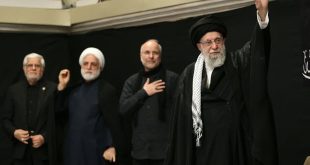The Grand Ayatollah Sistani in an important Fatwa about decedents of Coronavirus emphasized that “It is not permissible to burn the Muslim dead bodies and their relatives and others must prevent it and insist that they be buried on the basis of what is obligatory in Sharia’ “.
The Grand Ayatollah Sistani answered the questions sent to his office about the decedents of Coronavirus.
The responses, issued in a statement by the office of the Grand Ayatollah Sistani, emphasize that ablution, camphorating, shroud and related items should be handled with precautions.
The Fatwa states that if it is not possible to have ablution, “Tayammom” (ablution with earth or sand) will be sufficed and if the Tayammom is not available or the authorities prevent it, the body could be buried without ablution.
The full text of questions and Ayatollah Sistani’s answers are as follows:
In the name of God, The Most Compassionate, The Most Merciful
The following questions are about the decedents of the Coronavirus:
Assalamu Alaikum wa Rahmatullahi wa Barakatuhu
Question: Is the ablution of a Muslim who died because of Coronavirus is obligatory just as the other decedents, or Tayammom is sufficient? And what if the authorities don’t allow Tayammom as put the dead body in special bags with chemical preservatives and it is forbidden to open them before burial?
Answer: If ablution is not possible for fear of transmitting the disease, but it is possible for Tayammom to be performed even with the use of glove, it should be done but if Tayammom is not possible either, or the authorities prevent it, the body must be buried without ablution or Tayammom.
Question: If decedents’ camphorating and daubing the camphor on the seven places of prostration are not possible, is there any substitute for it?
Answer: Under such circumstances, camphorating will be abolished and there is no substitute.
Question: Is the triple enshroud of decedents obligatory, and what should be done if authorities do not allow to open the bag with which the dead body is covered?
Answer: Enshrouding the dead body with triple graveclothes is even obligatory on the bag. If it is not possible to enshroud the decedent with all of them, it should be enshrouded with whatever is possible, such as a bedsheet which covers the entire body.
Question: In some non-Islamic countries, the corpses of Corona decedents are burned; is it permissible to allow the Muslim dead bodies to be burned or their families should prevent it?
Answer: Burning the Muslim dead bodies is not permitted and their relatives and others must prevent it and insist on burial on the basis of what is obligatory in the Hanif religion.
Question: What is the mandate to put the Muslim dead body in the coffin and bury the coffin?
Answer: It is permissible, but it should be possible for the decedent to be placed in the coffin on his/her right side and facing the Qibla, as when buried in the ground.
Question: Experts say that Corona decedents can be buried in conventional graveyards of the country, and there is no need to do specific measures about the depth of the grave, etcetera, because the virus’s survival depends on living cells and after the death of the infected person, the virus lasts for hours but has no way to go out of the body and thus disappears, so taking precautions such as wearing gloves and masks and the like at the time of transferring the body of the infected person and burying it will suffice, and there is no worries about transmitting the virus to others after burial. In such circumstances, what is the decree of preventing the burial of the Corona decedents in public cemeteries, albeit in a place separate from other graves, contrary to their wills or their relatives’ demands?
Answer: Prevention of burial in public cemeteries is not permissible, and the authorities should facilitate this.
The office of the Grand Ayatollah Sistani
3th Sha’ban 1441 AH
 Ijtihad Network Being Wise and Faithful Muslim in the Contemporary World
Ijtihad Network Being Wise and Faithful Muslim in the Contemporary World
